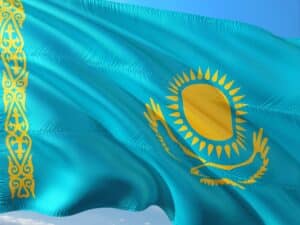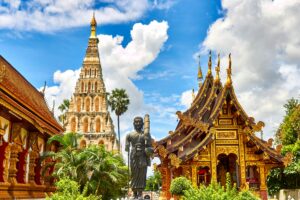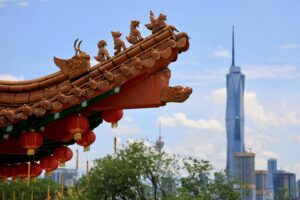Thailand, often known for its scenic beauty, delicious food, and vibrant culture, is gradually becoming a preferred destination for those seeking a longer or permanent stay. This tropical paradise doesn’t just offer a beautiful environment but also an array of immigration options and a potentially tax-free life.
Thailand: An Economical Living Destination
Thailand‘s cost of living is relatively lower compared to many Western countries. Rent, in particular, is significantly cheaper, with high-quality accommodation available at a fraction of what it would cost in major cities like New York or London. For instance, as per the Cost of Living Index by Numbeo, a one-bedroom apartment in the city center of Bangkok costs about $600 per month, while the same in New York City can easily exceed $3000.

Exploring Popular Visa Programs
In addition to the Thai Elite program, there are other visas for extended stays in Thailand, each with its unique requirements. The popular Education Visa, although currently paused, allows foreigners to stay in Thailand to study virtually anything. The Retiree Visa, on the other hand, is an easy option for those over 50, requiring a specific deposit in a local Thai bank account and proof of a monthly income. The newly introduced Long Term Residency Visa caters to business people, wealthy individuals, and professionals with high skill levels, offering numerous benefits.

Job Prospects for Expats in Thailand
Job opportunities for expats in Thailand are plentiful, especially for those in industries like education, hospitality, IT, and real estate. However, the salaries often don’t match Western standards. On the flip side, with the low cost of living, it’s possible to maintain a comfortable lifestyle. Average salaries in Thailand can provide a more detailed perspective on different industries and roles.
Deciding to work in Thailand requires weighing the benefits against potential challenges. While the cost of living and the opportunity to experience a new culture are enticing, the lower salaries and potential language barriers can pose challenges. However, many expats find the overall experience enriching, making the move worthwhile.

Leveraging Offshore Companies for Tax Benefits
One compelling reason to consider Thailand for extended stay or permanent residency is the potential tax benefits. Expats can leverage offshore companies to reduce their tax liabilities significantly. Forming an overseas company, especially an American LLC, can harmonize with Thai residency, offering substantial financial advantages.

Asset Protection: Safeguarding Your Wealth in Thailand
Protecting one’s wealth is a crucial aspect of financial planning. Various strategies can be employed for this purpose, such as diversifying investments across different asset classes and geographical regions, establishing trusts or foundations, and investing in insurance products. Thailand offers several options for asset protection, such as real estate investment, which is often considered a safe and profitable way to protect and grow one’s wealth. Additionally, investing in Thai bonds or local businesses can provide substantial returns, offering another way to protect and grow your assets.
Thailand offers an attractive environment for protecting one’s wealth due to its stable political and economic climate. Additionally, the Thai legal system provides robust protection for property rights, making it a popular choice for real estate investors. Another strategy for protecting your wealth in Thailand is to hold assets in a Thai bank account.
Thai banks are known to be stable and reliable, and they offer a range of services that can be useful for wealth protection. Furthermore, the country has strict banking laws in place to protect depositors. Holding assets in a Thai bank account can also provide a level of protection against currency fluctuations, as assets held in Thai Baht are not affected by changes in the value of other currencies. However, it’s important to note that while Thai banks are generally safe, they are not insured by an agency like the FDIC in the United States, so it’s crucial to choose a reputable bank.
In addition to banking, investing in Thai businesses can be a lucrative way to protect and grow your wealth. The country’s economy is dynamic and diverse, with strong sectors in tourism, manufacturing, and agriculture. However, foreign ownership of Thai companies is subject to certain restrictions and regulations, so it’s advisable to consult with a local attorney or investment advisor before making any significant investments.

Real Estate Investment in Thailand
Investing in real estate can be a good way to protect your wealth, and Thailand has a thriving real estate market that offers many opportunities for investors. Properties in popular tourist areas like Bangkok, Phuket, and Pattaya often appreciate in value over time, making them a good investment. Additionally, these properties can generate income through rentals.
However, foreign ownership of land in Thailand is generally prohibited, although there are some exceptions and workarounds. For example, foreigners can own condominium units outright, as long as no more than 49% of the total area of the condominium is owned by foreigners. Alternatively, a foreigner can set up a Thai Limited Company to purchase land, with the foreigner owning no more than 49% of the company’s shares.














